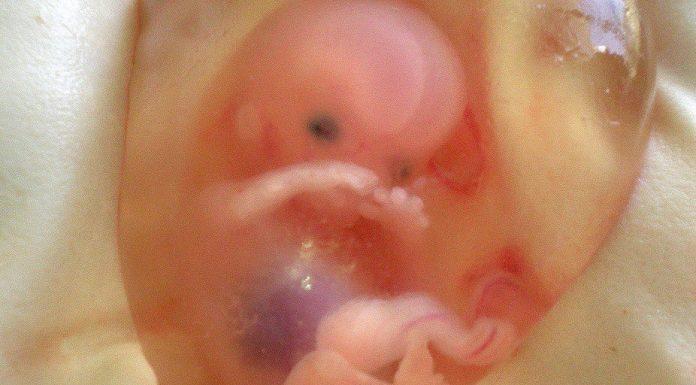(Headline USA) A divided federal appeals court lifted the hold Tuesday on an Ohio law that prohibits doctors from performing abortions based on a fetal diagnosis of Down syndrome, a case considered nationally pivotal.
The landmark case gives hope to pro-life advocates that the discriminatory treatment of down syndrome children will come to an end.
The case could go all the way to the Supreme Court.
“We applaud today’s ruling upholding Ohio as a safe haven for unborn babies with Down Syndrome,” Susan B. Anthony List said in a statement. “This bill has the potential to pose a significant challenge to Roe.”
“We also recognize and celebrate that this legislation has the potential to pose a significant challenge to Roe v. Wade,” the group added. “Now that a circuit split has occurred on the issue of whether states may prohibit the eugenic practice of discrimination abortion, the Supreme Court has even more reason to weigh in on this important matter and declare these laws as constitutional.”
The majority said Planned Parenthood and several other abortion providers represented by the American Civil Liberties Union erred in basing their case on a woman’s “absolute right” to an abortion until the fetus is viable outside the womb, because that right is neither absolute nor germane to the case.
“In this case, Ohio does not rely on its interest in protecting potential fetal life,” the ruling said. Its interests in passing the law, instead, were to protect the Down syndrome community from “the stigma it suffers from the practice of Down-syndrome-selective abortions,” to protect women who suspect Down syndrome from coerced abortions and to protect the medical community from unethical doctors, they wrote.
Judges of the 6th U.S. Circuit Court of Appeals narrowly ruled to reverse two earlier decisions blocking enforcement of the 2017 law based on the likely success of overturning it as unconstitutional.
A majority of the court, which has moved rightward in recent years with six appointments by former President Donald Trump, said the law doesn’t impede a woman’s right to an abortion.
The ACLU had sued the state health department, state medical board and county prosecutors in 2018 on behalf of abortion providers, arguing the law infringes on a woman’s constitutional right to a procedure that is legal. The state argued the law does not ban the procedure but instead regulates doctors.
The 2017 law had been put on hold while the legal challenge is decided. It is one of several Ohio abortion restrictions tied up in court.
“Today, the Sixth Circuit allowed politicians to exploit the real needs and concerns of people with Down syndrome to push their anti-abortion agenda,” Chrisse France, executive director of Preterm Cleveland, said in a statement. “No one should be able to make these decisions other than the patients and families we serve.”
During a rare hearing before the full 16-judge court in March 2020, Jessie Hill, an attorney for the ACLU of Ohio, argued that the Down syndrome law unconstitutionally seeks to take “the ultimate decision” on abortion away from the woman.
This and similar proposals around the country have triggered emotional debate over women’s rights, parental love, and the trust between doctor and patient.
“It’s unfortunate that the court gave so little weight to the importance of open and honest communication within the doctor-patient relationship,” Hill said in a statement Tuesday.
Ohio Solicitor General Ben Flowers said the law seeks to prevent abortions that target and discriminate against those with Down syndrome. That argument dovetailed with the contentions of anti-abortion groups, including Ohio Right to Life.
Tuesday’s decision was praised by the national anti-abortion group Susan B. Anthony List, whose president, Marjorie Dannenfelser, said it made Ohio “a safe haven for unborn babies with Down syndrome.”
“This law includes reasonable, compassionate measures to prevent lethal discrimination in the womb,” she said in a statement. Dannenfelser said now that a circuit split has occurred on the issue, it gives the U.S. Supreme Court “even more reason to weigh in” in what abortion foes hope could be a revisiting of the landmark Roe v. Wade ruling that legalized abortion. Both Dannenfelser and Ohio Right to Life President Mike Gonidakis likened abortions based on a Down syndrome diagnosis to eugenics.
Abortion rights groups have been joined by some parents of children with Down syndrome in opposing the law, saying the genetic disorder was being used to gain sympathy for a new restriction.
In legal filings, attorneys for the government contend that the sidelined law does not infringe on a woman’s constitutional rights because it “does not prohibit any abortions at all.”
Dissenting judges rejected that notion outright.
The law specifically prohibits physicians from performing an abortion if they’re aware that a diagnosis of Down syndrome, or the possibility of such a diagnosis, is influencing the decision. Doctors could face a fourth-degree felony charge, be stripped of their medical license, and be held liable for legal damages. The pregnant woman faces no criminal liability under the law.
Adapted from reporting by the Associated Press.

